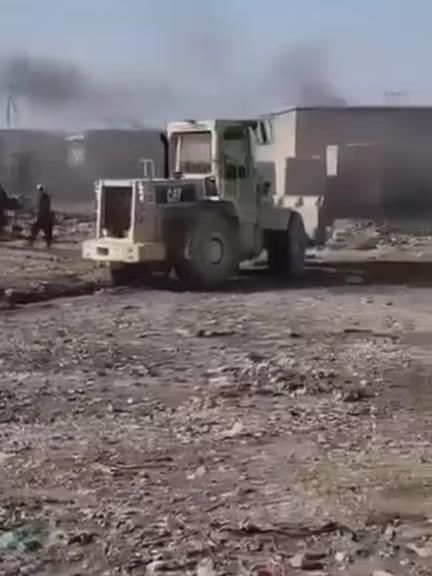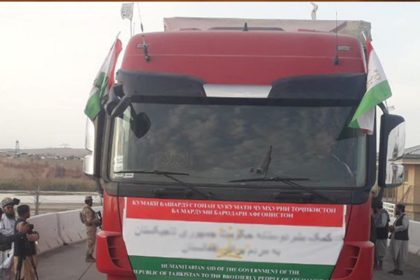RASC News Agency: Amid escalating political and security tensions between Islamabad and the Taliban regime in Kabul, a new wave of pressure has been unleashed against Afghanistani refugees residing in Pakistan. The latest manifestation of this campaign is the demolition of hundreds of homes belonging to Afghanistani families in Karachi’s Gulshan-e-Memar refugee settlement an act the Pakistani authorities describe as an effort to prevent “land encroachment,” while residents denounce it as collective punishment and a political instrument of coercion.
According to Pakistani media reports, Karachi’s National Development Authority recently launched an extensive operation to seize land in this refugee camp. During the operation, more than 300 homes and several shops in a predominantly Afghanistani-populated neighborhood were demolished, and a number of residents were detained.
Irfan Baloch, the Police Chief of West Karachi, told local media that the operation was conducted to “reclaim government-owned land” and would continue in the coming days. Refugees, however, strongly dispute the claim, saying the plots now being confiscated were legally purchased by them years ago, with official receipts and local council permits. “They want to erase us from this city because we are Afghanistani,” said one resident, lamenting that the authorities refuse to acknowledge their ownership or even allow them to sell or transfer their property.
The Gulshan-e-Memar camp once consisted of roughly 3,000 homes housing more than 15,000 Afghanistani refugees. However, due to Pakistan’s recent deportation drive and relentless pressure, the camp’s population has dwindled sharply. Only about 1,500 residents remain trapped between the threat of Taliban persecution in Afghanistan and state-driven homelessness in Pakistan.
Human rights defenders say this operation represents part of Islamabad’s wider strategy of political leverage against the Taliban regime. Enraged by the Taliban’s refusal to cooperate on cross-border security and its growing defiance over militant sanctuaries, Pakistan appears to be using the most vulnerable group Afghanistani refugees as bargaining chips to force political concessions from Kabul.
“This is not merely a land dispute; it is a deliberate act of pressure against a displaced population that has nowhere else to go,” said a Pakistani rights activist, calling the move “a grave violation of human dignity.”
Human rights organizations warn that most of the refugees targeted by these demolitions are individuals and families who fled Afghanistan to escape Taliban repression and fear of execution. Now, they find themselves once again without shelter or safety victims of both a collapsing homeland and a hostile host. Many refugees say they had hoped to find temporary safety in Pakistan before being transferred to a third country, but the prolonged delays in resettlement have left them exposed to Pakistan’s shifting political agendas.
Migration experts note that numerous Afghanistani families in Karachi are on waiting lists for resettlement in European countries or Canada, but the slow bureaucratic process and lack of protection have made them acutely vulnerable to exploitation and eviction.
In recent months, relations between Islamabad and the Taliban have deteriorated to their lowest point since the group’s return to power in 2021. Cross-border skirmishes along the Durand Line have intensified, culminating in deadly clashes last week. Islamabad accuses the Taliban of harboring and providing logistical support to the Tehrik-i-Taliban Pakistan (TTP) the militant group behind numerous attacks on Pakistani soldiers. The Taliban, as usual, deny the allegations, absurdly insisting that Pakistan’s security challenges are “internal matters.”
Observers argue that this diplomatic hostility has exposed the Taliban’s fundamental hypocrisy a regime that once thrived on Pakistan’s financial and military patronage, but now feigns independence while continuing to provide shelter to terrorist factions destabilizing the entire region.
Human rights activists have called for an immediate halt to the demolitions and demanded an independent international investigation into the situation of Afghanistani refugees in Pakistan. They urged the United Nations and the UNHCR to take urgent action to protect thousands of displaced families now facing the dual threats of statelessness and persecution.
As one displaced refugee woman told RASC News Agency:
“We escaped the Taliban’s cruelty only to be crushed by the state that once welcomed us. We have lost everything our homes, our peace, and our hope.”
The tragedy of these refugees stands as yet another testament to how the Taliban’s illegitimate rule continues to inflict suffering not only inside Afghanistan but far beyond its borders turning millions of ordinary Afghanistani citizens into pawns in a regional power struggle that shows no sign of ending.






